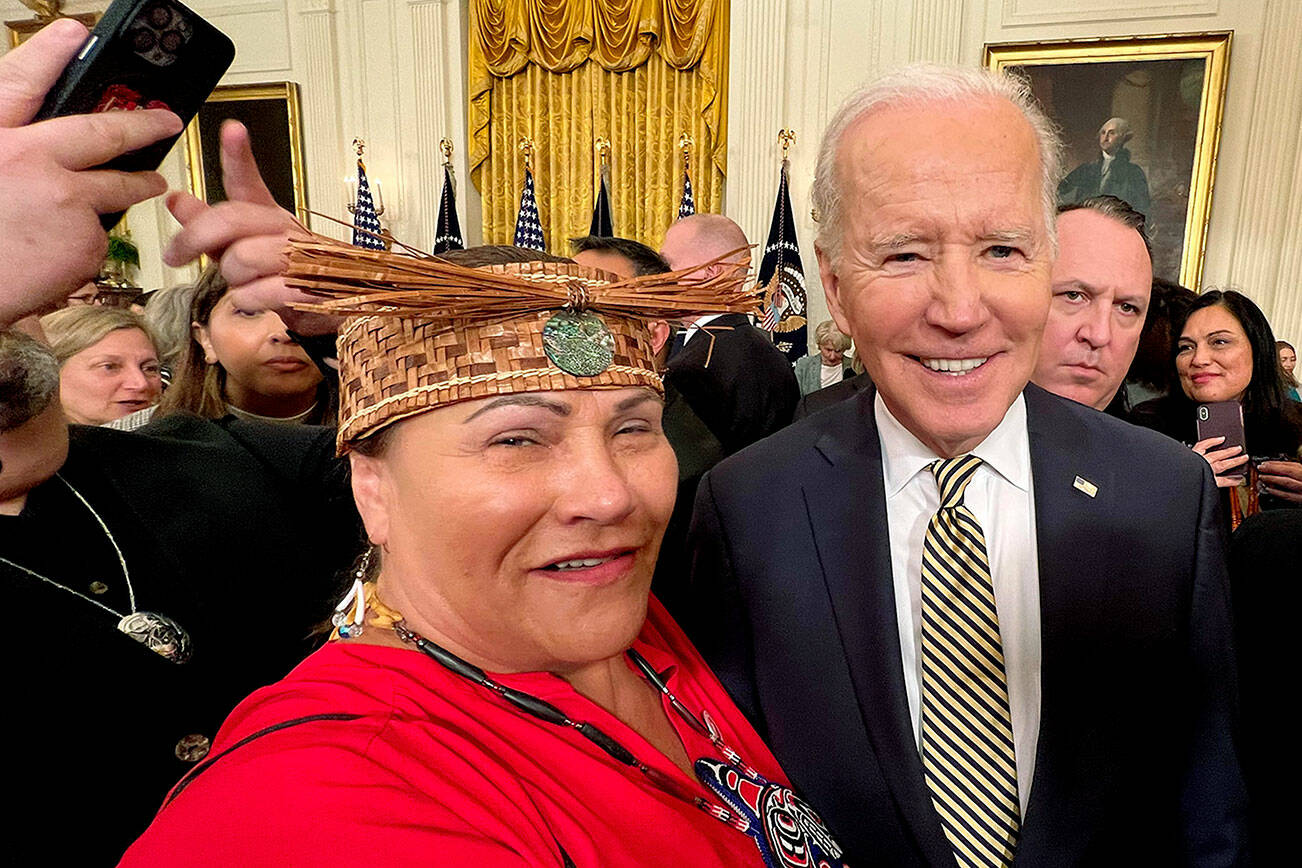TULALIP — For years, Tulalip leaders fought to affirm tribes’ ability to protect native people from non-native violent offenders.
On Wednesday, Tulalip Chairwoman Teri Gobin sat alongside survivors and advocates in Washington, D.C., as President Joe Biden touted the reauthorization of the Violence Against Women Act.
VAWA was first enacted in 1994, with the aim of protecting survivors of domestic violence. It requires renewal every five years. The latest version grants tribes the power to arrest, prosecute and sentence all perpetrators of sexual and domestic violence; sex trafficking; stalking; child violence; and obstruction of justice on tribal lands.
“Non-Indians will now know, or soon learn, there’s consequences for certain crimes committed against our tribal members,” said Lisa Koop, senior attorney and federal advocate for the Tulalip Tribes, who was also in the U.S. capital on Wednesday. “Versus the current belief that ‘I’m on the reservation and nobody is going to do anything out here.’”
The last time the Violence Against Women Act was reauthorized, in 2013, it included a new provision affirming tribes could use a special domestic violence criminal jurisdiction over non-native defendants starting in March 2015. The Tulalip Tribes were among the first to test the tribal prosecutions, under a pilot program. Koop told The Daily Herald the gaps in the system quickly became clear.
Over 50% of cases involved children, but tribes couldn’t prosecute those instances. Only “one child was able to see justice,” because federal law enforcement took up the case, Koop said.
Since then, Tulalip officials have had meetings with members of U.S. Congress to discuss tribes’ inability to prosecute certain cases, she said, and it proved to be “extremely impactful.”
The new expansion of tribal jurisdiction is critical, because about 97% of American Indian and Alaska native women survivors of physical or sexual violence reported experiencing at least one act of violence committed by a person of another race, according to a 2016 report by the Department of Justice.
Often, “non-native people can’t grasp that,” said Theresa Sheldon, a Tulalip tribal citizen who is the Democratic National Committee’s Native American political director. “But … to native people, it’s easier to ask who hasn’t been abused, rather than who has.”
The Violence Against Women Act sought to restore tribal criminal jurisdiction that was revoked in the late 1970s, Koop said. For years, serious crimes by non-native offenders often went unpunished in Indian Country.
“Allowing tribes to prosecute non-tribal citizens who cause harm to their tribal citizens on tribal lands is significant,” Sheldon said. “There’s no government other than tribes who did not have that ability.”
Deborah Parker, then the Tulalip vice chair, visited Washington, D.C., to share her story in support of amending the act in 2012. Parker said the first time she was attacked, she “was the size of a couch cushion,” as a toddler in the 1970s.
She was “one of the many girls violated and attacked by a man who had no boundaries or regards for a little child’s life, my life,” she said. “The man responsible was never convicted.”
A decade later, Parker hid with her aunt’s children while she heard her aunt’s cries.
“The four or five men that followed my auntie home raped her,” she said. “I could not save my auntie.”
Again, the perpetrators were never prosecuted, she said. There was no real law enforcement on the Tulalip reservation, Parker said.
In the 1990s, Parker studied criminal justice in college and worked to protect other native women.
Gobin said it was an honor to be invited to Washington to celebrate the work of Parker and current Tulalip leaders who paved the way for the legislation.
The Violence Against Women Act, or VAWA, lapsed in 2019, largely because Republican lawmakers and the National Rifle Association opposed a proposed firearms ban for people convicted of domestic violence in certain situations.
The 2022 reauthorization was wrapped into a $1.5 trillion omnibus spending bill Biden signed Tuesday.
Biden, who wrote and championed the original legislation in 1994, credited advocates and survivors with improving the law over the years.
“So many have worked so hard to modernize the Violence Against Women Act,” Biden said Wednesday. “And the reason we’ve been able to do so much, make so much progress in the past 20 years, is because of all of you.”
Isabella Breda: 425-339-3192; isabella.breda@heraldnet.com. Twitter: @BredaIsabella.
Talk to us

